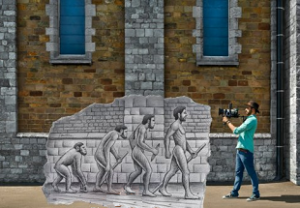
Second dichotomy: nature vs. culture
All the classical philosophy on the development of the State goes through man’s relationship with nature, when in fact it with the culture, for nature is unique and it is possible to speak of a unified theory of nature as Edgar Morin said in his method: ” The nature of nature, “which is not the culture.
in fact it with the culture, for nature is unique and it is possible to speak of a unified theory of nature as Edgar Morin said in his method: ” The nature of nature, “which is not the culture.
Francis Bacon gives rise to empiricism, had already saying that “you can not dominate nature to not obey it,” but the empiricist John Locke say later disagreeing with Tomas Hobbes that man is not a wolf to man as this thought but develops its nature within a society, why then is not culture and society.
Jean Jacques Rousseau will theorize the noble savage, the naive man who lives in the society, all these so-called theoretical “contractualist” are not doing anything other than justifying state violence, Francis Fukuyama will say that Aristotle would disagree with it precisely because the Self Aristotelian It is not at odds with nature, as well: “Aristotle disagreed (the correct translation would disagree) of Hobbes, Locke and Rousseau in a critical aspect. It claimed that humans are political in nature and that their natural abilities take them to flourish in society “(Fukuyama, 2013, p. 42).
So political “in nature” by no means a certain way or “cultural” policy or state, that is why we fall in this cultural dichotomy and unnatural.
Edgar Morin explains: “In short, the acceptance of the confusion can become a way to resist the crippling simplification. It is true that we lack the method to departure; but at least we have the antimétodo, where ignorance, uncertainty and confusion become virtues. “(MORIN, 1977, p.19).
The nature explains Morin is the difficulty of separate knowledge: “So the choice is not between knowing particular, precise, limited, and abstract overview. It lies between mourning and research of a method able to articulate what is separate and unite what is dissociated.” (MORIN, 1977, p.18).
The basis of this dialogue, and return to the question of Being, also overcome one must know the dialogical dialectic, which also means weaving things that are apparently separate as the reason and emotion, the sensible and the intelligible, the real and the imagination, reason and myth, science and art.
We must then find a new metaphor, which is thought that the question of the body, for its organic which is able to put the knowledge into the relatedness they require.
FUKUYAMA, Francis. The Origins of Political Order: From Prehuman Times to the French Revolution. N.y.: Macmillan . 2011.
MORIN, Edgar. Method I: the nature of nature. L.A.: P. Lang, 1992.









